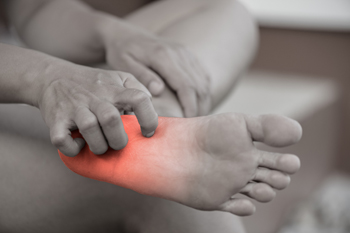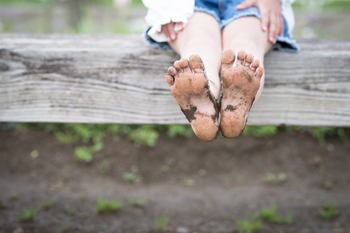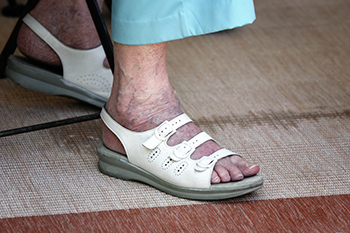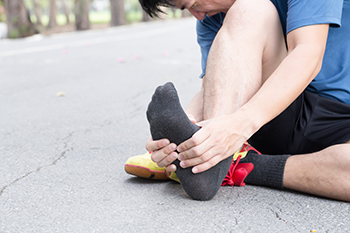December 2022
What Can Cause Neuropathy?

Peripheral neuropathy can cause a numbing and tingling sensation in the legs and feet. It is defined as nerve damage and it affects approximately half of diabetic patients. The nerves can become impaired as a result of elevated glucose and triglyceride levels that are found in the blood, which can lead to the small blood vessels that help to nourish the nerves being compromised. Common symptoms that are associated with neuropathy can include a burning, numbing, or tingling sensation in the feet and it is often difficult to walk. There may be a natural change in gait, or walking style, to compensate for these sensations. Balance may also be affected and the feet can appear swollen. It is helpful to learn about neuropathy prevention techniques, which can include monitoring glucose, cholesterol, and blood pressure levels. If you are afflicted with neuropathy, please consult with a podiatrist who can confirm this condition and guide you toward the correct treatment methods
Neuropathy
Neuropathy can be a potentially serious condition, especially if it is left undiagnosed. If you have any concerns that you may be experiencing nerve loss in your feet, consult with John Killough, DPM from Regional Foot Center. Our doctor will assess your condition and provide you with quality foot and ankle treatment for neuropathy.
What Is Neuropathy?
Neuropathy is a condition that leads to damage to the nerves in the body. Peripheral neuropathy, or neuropathy that affects your peripheral nervous system, usually occurs in the feet. Neuropathy can be triggered by a number of different causes. Such causes include diabetes, infections, cancers, disorders, and toxic substances.
Symptoms of Neuropathy Include:
- Numbness
- Sensation loss
- Prickling and tingling sensations
- Throbbing, freezing, burning pains
- Muscle weakness
Those with diabetes are at serious risk due to being unable to feel an ulcer on their feet. Diabetics usually also suffer from poor blood circulation. This can lead to the wound not healing, infections occurring, and the limb may have to be amputated.
Treatment
To treat neuropathy in the foot, podiatrists will first diagnose the cause of the neuropathy. Figuring out the underlying cause of the neuropathy will allow the podiatrist to prescribe the best treatment, whether it be caused by diabetes, toxic substance exposure, infection, etc. If the nerve has not died, then it’s possible that sensation may be able to return to the foot.
Pain medication may be issued for pain. Electrical nerve stimulation can be used to stimulate nerves. If the neuropathy is caused from pressure on the nerves, then surgery may be necessary.
If you have any questions, please feel free to contact our offices located in Charleston and Effingham, IL . We offer the newest diagnostic and treatment technologies for all your foot care needs.
Pay Attention to Children’s Foot Problems

Children’s foot problems often go undiagnosed because parents do not know what to pay attention to, or they believe their kids will outgrow the problems. Ankle and foot ailments can be common in children because they are so physically active, but it can be easy to overlook these things because kids are so resilient. Parents should watch for symptoms of common foot and ankle problems among children. These problems include ankles turning in more than usual, pain, the arch of the foot flattening, cramping, limping, or a change in the activity level of the child. Children who participate in sports are most apt to experience foot and ankle issues. If your child exhibits the symptoms described above, consult with a podiatrist so that the risk of problems turning into more serious or chronic conditions is mitigated.
The health of a child’s feet is vital to their overall well-being. If you have any questions regarding foot health, contact John Killough, DPM of Regional Foot Center. Our doctor can provide the care you need to keep you pain-free and on your feet.
Tips for Keeping Children's Feet Healthy
- Make sure their shoes fit properly
- Look for any signs of in-toeing or out-toeing
- Check to see if they have Clubfoot (condition that affects your child’s foot and ankle, twisting the heel and toes inward) which is one of the most common nonmajor birth defects.
- Lightly cover your baby’s feet (Tight covers may keep your baby from moving their feet freely, and could prevent normal development)
- Allow your toddler to go shoeless (Shoes can be restricting for a young child’s foot)
- Cut toenails straight across to avoid ingrown toenails
- Keep your child’s foot clean and dry
- Cover cuts and scrapes. Wash any scratches with soap and water and cover them with a bandage until they’ve healed.
If you have any questions, please feel free to contact our offices located in Charleston and Effingham, IL . We offer the newest diagnostic and treatment technologies for all your foot care needs.
Foot Care Is Critical for Seniors

As we age our feet change and things can happen to our feet that affect our overall health and quality of life. Specific foot issues may arise depending on the shoes worn, level of activity, and genetics. With all the wear and tear our feet endure throughout our lifetimes, it’s no wonder there would be stress and strain felt as we age. With aging, our cells hold less water, which in turn can affect collagen, tendons, and ligaments in the feet. Tendons generally get tighter, and ligaments may get looser. With aging, circulation can decline as well as our body’s natural healing ability. Overuse and joint issues are also more common with age. When things in the feet shift, bone spurs can develop, and we can feel pain. To deal with the likely inevitabilities of foot issues, if you are a senior or a caregiver, include a podiatrist in your health care team and schedule regular check-ups.
If you need your feet checked, contact John Killough, DPM of Regional Foot Center. Our doctor will attend to all of your foot and ankle needs and provide you with quality treatment.
Geriatrics and Podiatry
When people age, some common issues that may occur are bone density loss, dry skin, poor circulation, and rough brittle nails. These issues may also affect your foot health if the necessary steps are not taken to alleviate the problems.
It is important to take care of your feet because feet that are injured or diseased can affect your overall health. Having painful feet hinders your ability to do daily activities or may decrease your willingness to do the things that you need to do.
Visiting Your Geriatrician
As we age, health problems become more likely, so it is essential to visit your doctor for check-ups to ensure that you are doing the best you can to take care of your health. It is recommended to check your feet frequently for any possible cuts, bruises, swelling, corns or any other irregularities.
Taking Care of Elderly Feet
Cracked or dry feet can be treated by applying moisturizer often. It is also important not to wear old socks because the older the sock is, the higher the possibility there will be that there is bacteria there. Wear fresh socks and make sure they fit properly.
Proper foot health means that you can have a more active lifestyle and you will not be bogged down by pain. Foot health also leads to good circulation, which is paramount for overall health.
If you have any questions, please feel free to contact our offices located in Charleston and Effingham, IL . We offer the newest diagnostic tools and technology to treat your foot and ankle needs.
Reminder: When Was the Last Time...?
Heel Pain May Be a Symptom of Plantar Fasciitis

Heel pain is a common foot condition that is felt by many patients. People experience plantar fasciitis at some point in their lives, which can cause severe pain and discomfort. It can happen when the plantar fascia becomes inflamed, which is the band of tissue that is found on the sole of the foot. It connects the heel to the toes and can become irritated or torn for various reasons. These can include standing on hard surfaces for most of the day, or wearing shoes that do not have adequate heel support. Additionally, people who frequently run may have heel pain that may be a symptom of plantar fasciitis. Mild relief may come from performing specific calf stretches that can ease heel pain. Elevating the feet may bring temporary relief, and it is suggested to refrain from running and walking long distances. Plantar fasciitis is a foot condition that is treated by a podiatrist. If you suffer from heel pain, it is suggested that you contact this type of physician who can determine what the cause is, and offer effective treatment remedies.
Many people suffer from bouts of heel pain. For more information, contact John Killough, DPM of Regional Foot Center. Our doctor can provide the care you need to keep you pain-free and on your feet.
Causes of Heel Pain
Heel pain is often associated with plantar fasciitis. The plantar fascia is a band of tissues that extends along the bottom of the foot. A rip or tear in this ligament can cause inflammation of the tissue.
Achilles tendonitis is another cause of heel pain. Inflammation of the Achilles tendon will cause pain from fractures and muscle tearing. Lack of flexibility is also another symptom.
Heel spurs are another cause of pain. When the tissues of the plantar fascia undergo a great deal of stress, it can lead to ligament separation from the heel bone, causing heel spurs.
Why Might Heel Pain Occur?
- Wearing ill-fitting shoes
- Wearing non-supportive shoes
- Weight change
- Excessive running
Treatments
Heel pain should be treated as soon as possible for immediate results. Keeping your feet in a stress-free environment will help. If you suffer from Achilles tendonitis or plantar fasciitis, applying ice will reduce the swelling. Stretching before an exercise like running will help the muscles. Using all these tips will help make heel pain a condition of the past.
If you have any questions please contact our offices located in Charleston and Effingham, IL . We offer the newest diagnostic and treatment technologies for all your foot and ankle needs.





